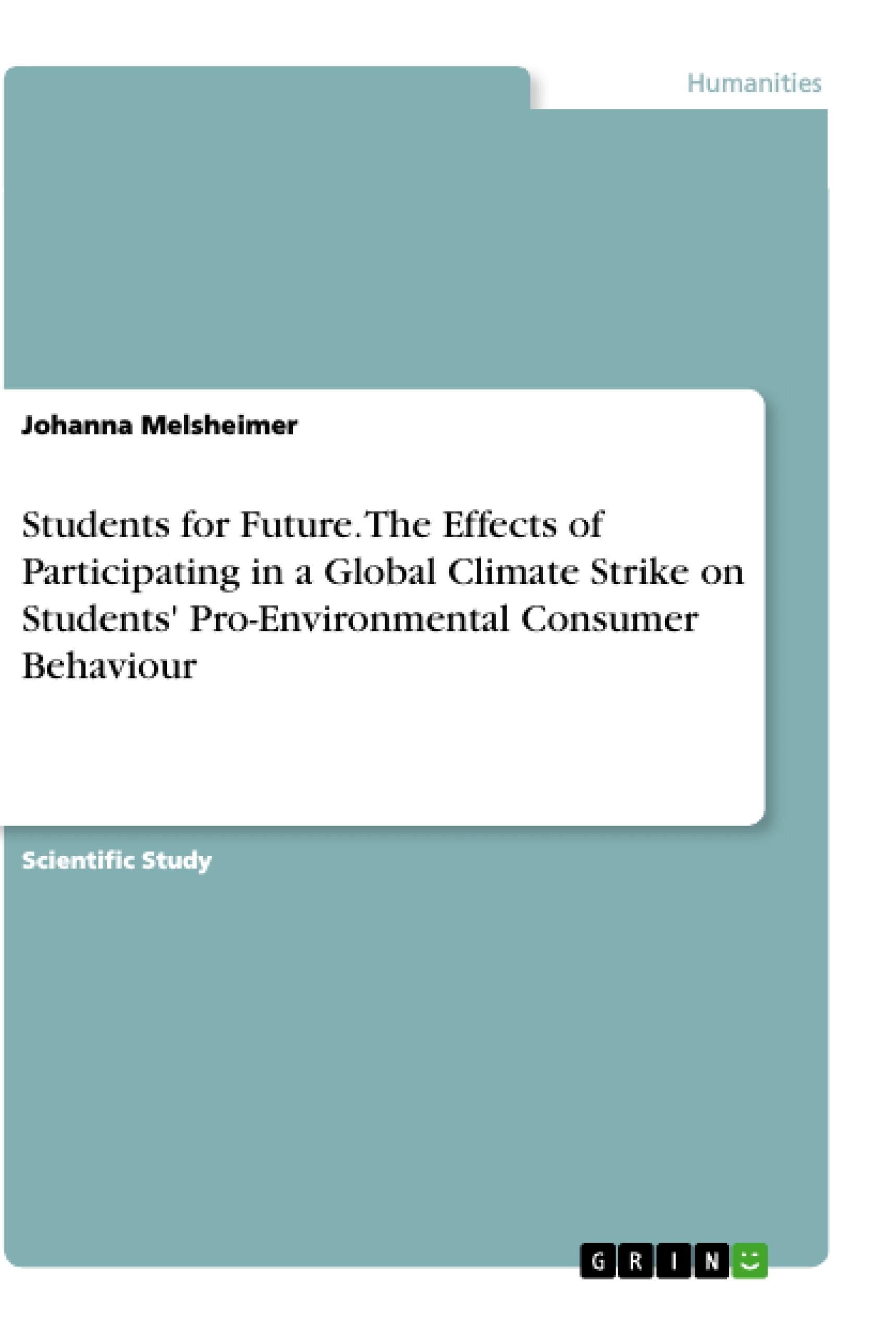As climate change is a prominent challenge in today’s world, a global awareness towards achieving individual environmental change is necessary. This social research looks into how participating in climate strikes can lead to adopting a pro-environmental consumer behaviour (PECB). The quantitative analysis measured 105 questionnaires, while the qualitative part analysed 12 interviews with students studying in the Netherlands, France, Belgium, Germany, and Luxembourg. Changes in PECB were discovered by looking at the mechanisms endogenous factors, exogenous factors, and altruistic values which emerge during climate protests. The analysis established a positive relationship between the feeling of belonging to a group of likely-minded people and PECB. Furthermore, an overall positive change in PECB before and after participating in the climate protest. However, the quantitative results for the relationship in the belief in achieving a change and PECB were inconclusive. For the qualitative findings, the concept of gaining altruistic values was under-represented. The concepts of achieving a change and belonging to a group of likely-minded people were highlighted by all interviewees. Concludingly, the participation in strikes only slightly increases PECB, as other factors of the person’s individual life also affect a change of behaviour.
Inhaltsverzeichnis (Table of Contents)
- Abstract
- I. Introduction
- II. Theoretical Framework:
- 1. Participation in global climate strikes: Political participation
- a. The concept political participation: requirements
- b. The effects of social movements
- 2. Theories on pro-environmental consumer behaviour
- a. The concept: pro-environmental consumer behaviour
- b. Value- belief- norm theory: altruistic values
- c. Multi-level factor model: endogenous and exogenous factors
- d. Spill over effects
- 1. Participation in global climate strikes: Political participation
- III. Methodology
- 1. Quantitative Methodology
- 2. Qualitative Methodology
- IV. Quantitative results
- 1. The effects of the respondents' belief in the possibility of achieving a change and the adoption of PECB
- 2. The effect of participants feeling of belonging to a group of likely-minded people and PECB
- 3. The effects of participating in a climate change protest on PECB
- V. Qualitative results
- 1. Ability to achieve a change
- 2. Belonging to a group of likely-minded people
- 3. Pro- environmental consumer behaviour
- 4. Altruistic values
- VI. Conclusion and Discussion
Zielsetzung und Themenschwerpunkte (Objectives and Key Themes)
The research aims to explore the impact of participation in global climate strikes on students' adoption of pro-environmental consumer behaviour (PECB). This study analyzes data from questionnaires and interviews conducted with students in various European countries, focusing on the effects of political participation, social movements, and individual values on environmental consciousness and action.
- The impact of global climate strikes on pro-environmental consumer behaviour (PECB).
- The role of political participation and social movements in promoting environmental awareness.
- The influence of personal values and group affiliation on PECB.
- The interplay of endogenous and exogenous factors in driving pro-environmental consumer behavior.
- The potential for spillover effects from climate protests on broader societal change.
Zusammenfassung der Kapitel (Chapter Summaries)
The introductory chapter delves into the pressing issue of climate change and its global implications. It highlights the role of globalization in exacerbating environmental vulnerabilities and discusses the rise of climate justice movements, particularly the Fridays For Future (FFF) protests spearheaded by Greta Thunberg. The chapter also defines social movements and their connection to political participation, focusing on the student-led climate strikes as a form of political expression.
The theoretical framework chapter explores the concepts of political participation, pro-environmental consumer behaviour (PECB), and relevant theories. It examines the mechanisms behind PECB, including value-belief-norm theory, the multi-level factor model, and spillover effects.
The methodology chapter outlines the quantitative and qualitative research approaches employed in the study. It describes the data collection methods, sample size, and analytical techniques used to investigate the research question.
The quantitative results chapter presents the findings from the questionnaire survey, focusing on the relationship between participation in climate strikes and the adoption of PECB. It analyzes the influence of individual beliefs, group affiliation, and the overall impact of protesting on pro-environmental consumer behavior.
The qualitative results chapter delves into the findings from the interviews conducted with student participants. It explores their experiences and perspectives on achieving change, belonging to a group of like-minded individuals, and their motivations for adopting pro-environmental consumer behaviours.
Schlüsselwörter (Keywords)
Climate protest, pro-environmental consumer behaviour, political participation, social movements, globalization, climate change, environmental consciousness, individual values, group affiliation, PECB, endogenous factors, exogenous factors, altruistic values, spillover effects, student activism.
Frequently Asked Questions
Does participating in climate strikes change consumer behavior?
The research found a positive relationship between participating in strikes and adopting pro-environmental consumer behavior (PECB), although individual life factors also play a significant role.
What is the "feeling of belonging" in the context of climate protests?
It refers to the sense of being part of a group of like-minded people, which was found to be a strong driver for students to adopt more sustainable habits.
What are endogenous and exogenous factors in PECB?
Endogenous factors are internal (like personal values and beliefs), while exogenous factors are external influences (like social movements or peer pressure) that drive environmental action.
How was the research conducted?
The study used a mixed-methods approach, analyzing 105 quantitative questionnaires and 12 qualitative interviews with students across several European countries.
What role do altruistic values play in pro-environmental behavior?
While the theory suggests altruistic values are important, the qualitative findings showed they were under-represented compared to the desire to achieve tangible change and group belonging.
- Quote paper
- Johanna Melsheimer (Author), 2019, Students for Future. The Effects of Participating in a Global Climate Strike on Students' Pro-Environmental Consumer Behaviour, Munich, GRIN Verlag, https://www.grin.com/document/499110



